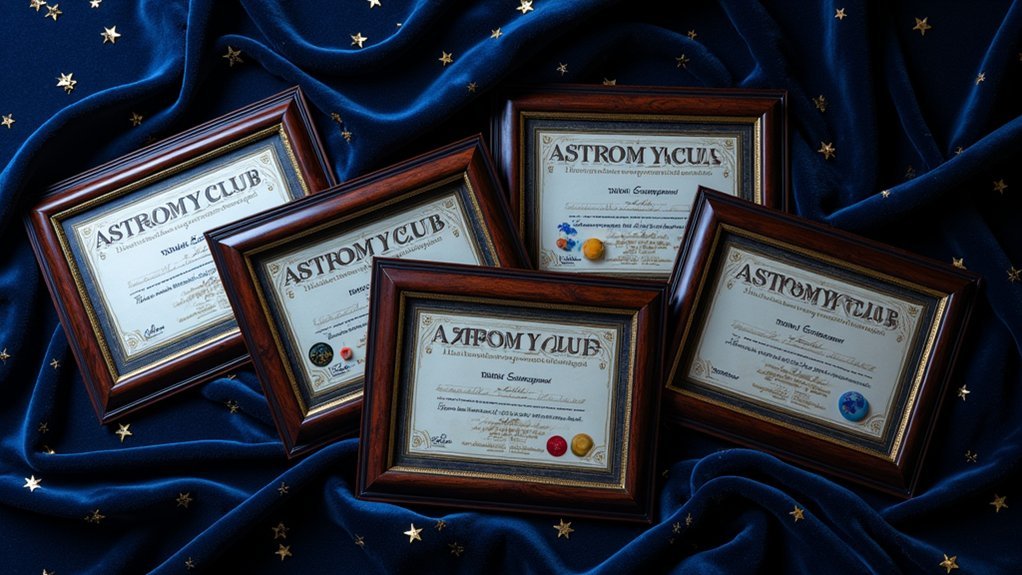Mastering astronomy vocabulary works best when you connect terms to visual references. Use star maps and flashcard apps like SkyView to identify celestial objects, and join local astronomy clubs for practical applications of new terminology. Keep an astronomy journal to document observations using technical terms, and practice daily with astronomy-themed games or puzzles. Regular stargazing sessions with mobile apps provide real-world context that transforms abstract concepts into meaningful knowledge you can build upon.
Building a Foundation of Basic Astronomical Terms

Astronomers, both amateur and professional, rely on a specific vocabulary to navigate the cosmos. To begin your astronomical journey, you’ll need to understand fundamental concepts like aperture—the diameter of a telescope’s main lens or mirror—which determines how much light you can gather from distant objects.
Learn to use a star map to locate celestial bodies using declination and right ascension coordinates, the sky’s equivalent to Earth’s latitude and longitude. When observing, you’ll need to understand magnitude scales to compare the brightness of stars and distinguish between celestial phenomena.
That bright shooting star you spotted isn’t actually a star but a meteor burning up in our atmosphere!
Familiarize yourself with various celestial objects like galaxies, nebulae, and exoplanets to build your astronomical vocabulary effectively.
Visual Learning: Connecting Words to Celestial Objects
Pictures transform abstract astronomical terms into tangible concepts you can recognize in the night sky. When you link celestial objects to their visual representations, you’re building neural pathways that make terminology stick.
| Learning Method | Benefits | Example Usage |
|---|---|---|
| Star Maps | Connects constellations to names | Identifying Orion’s Belt |
| Flashcards | Pairs terms with images | Learning nebula types |
| Planetarium Shows | Demonstrates celestial movements | Understanding eclipses |
| Visual Databases | Provides real-time examples | Exploring supernovas |
Use these visual learning techniques to transform astronomy vocabulary from intimidating jargon to familiar friends. When you see a stunning nebula through a telescope, you’ll instantly recall it’s a stellar nursery where new stars form, creating meaningful connections between words and the cosmic wonders they describe.
Daily Practice Methods for Astronomy Vocabulary Retention

Incorporating stargazing vocabulary games into your evening routine transforms technical terminology into an enjoyable learning experience that strengthens your astronomical knowledge.
You’ll find that celestial term flashcards offer a quick way to test yourself while waiting for the night sky to darken before observation sessions.
These portable learning tools can accompany you to remote viewing locations, allowing you to maximize downtime between celestial events by reinforcing your astronomy vocabulary.
Stargazing Vocabulary Games
Five engaging methods can transform your astronomy vocabulary practice from mundane to memorable. During nightly stargazing sessions, use star maps to identify constellations and star clusters, cementing terms through direct observation of what you’re learning.
Make vocabulary retention enjoyable with astronomy-themed crosswords and word searches that challenge your knowledge while reinforcing celestial terminology. Flashcards provide quick daily review opportunities, while online astronomy forums let you practice using new terms in authentic discussions.
For personalized learning, maintain an astronomy journal where you document observations using newly acquired vocabulary. This contextual usage helps terms stick in your memory.
These interactive approaches turn vocabulary building into an adventure rather than a chore, making astronomy language a natural extension of your stargazing experience.
Celestial Term Flashcards
Flashcards represent the cornerstone of effective astronomy vocabulary acquisition, turning abstract cosmic concepts into manageable learning units. By creating cards with celestial terms on one side and definitions or illustrations on the other, you’ll strengthen neural pathways through active recall.
Implement daily practice by reviewing a specific number of flashcards each day, gradually increasing as your cosmic knowledge expands. Spaced repetition software optimizes this process, presenting terms just before they fade from memory.
Don’t just memorize—engage with the vocabulary by writing sentences using these celestial terms in context. This application cements their meanings in your mind.
For maximum retention, join astronomy communities where you can discuss these concepts with fellow enthusiasts, reinforcing your learning through practical usage and social interaction.
Leveraging Digital Resources and Mobile Apps
While traditional textbooks offer foundational knowledge, today’s digital landscape provides dynamic tools to enhance your astronomy vocabulary. You’ll find mobile apps like SkyView and Star Walk that transform your device into a celestial guide, identifying stars and constellations as you point your phone skyward.
| Digital Resource | Learning Benefit |
|---|---|
| SkyView & Star Walk | Interactive star identification |
| NASA’s Eyes on Solar System | Immersive planetary exploration |
| Coursera/edX courses | Structured astronomy modules |
| Astronomy forums | Community vocabulary reinforcement |
| Anki/Quizlet | Personalized flashcard learning |
These digital platforms offer advantages traditional methods can’t match. From joining astronomy forums where terminology appears in authentic discussions to utilizing spaced repetition flashcard apps, you’ll reinforce your learning through varied contexts. NASA’s digital platforms provide detailed visuals that connect complex terms to their cosmic counterparts.
Group Learning: Astronomy Clubs and Online Communities

Joining your local astronomy club can accelerate your astronomy vocabulary development through interactive star parties, educational workshops, and conversations with experienced stargazers.
You’ll find these community settings provide real-world contexts to practice specialized terminology while examining celestial objects through telescopes alongside knowledgeable mentors.
Online astronomy communities complement in-person learning by connecting you with global enthusiasts who share explanations of astronomical phenomena and terminology through forums, social media groups, and virtual observation sessions.
Local Club Benefits
Three major advantages come with participating in a local astronomy club: shared resources, practical learning experiences, and expert guidance.
When you join a local club, you’ll gain access to telescopes and star maps that might otherwise be expensive or difficult to obtain. This shared equipment helps you apply astronomical terminology in real-world settings.
During regular star parties and observation nights, you’ll practice using specific astronomy terms while observing celestial objects alongside experienced members. These contextual learning opportunities cement your understanding far better than isolated study.
Many clubs also host educational workshops and bring in guest speakers, exposing you to current astronomical research and specialized vocabulary.
This expert guidance accelerates your learning process and connects you with mentors who can answer questions as your astronomy knowledge expands.
Virtual Learning Communities
Beyond local meetups, the digital domain offers expansive opportunities to build your astronomy vocabulary.
Online forums and social media groups dedicated to astronomy connect you with enthusiasts worldwide who can clarify complex astronomy terminology from diverse perspectives.
You’ll find virtual learning communities where members freely share resources like star charts, glossaries, and guides that help reinforce new terms in practical contexts.
Many organizations host webinars and structured virtual classes where you can interact with instructors and peers while learning vocabulary relevant to current astronomical discoveries.
These digital spaces allow you to ask questions, join discussions, and participate in virtual stargazing events—all while building your terminology knowledge at your own pace and from anywhere with an internet connection.
Hands-On Observational Learning Techniques
The most effective way to internalize astronomy vocabulary is through direct engagement with the night sky. By using star maps to identify constellations, you’ll gradually master the terminology for celestial patterns.
Regular stargazing sessions with telescopes or binoculars connect abstract terms like “nebula” and “galaxy” with visual experiences.
- Join local astronomy clubs where experienced enthusiasts can guide your learning
- Utilize mobile apps with augmented reality to identify celestial objects in real-time
- Keep an astronomy journal documenting observations and associated terminology
- Attend public viewing events to discuss terms in their proper context
These hands-on approaches transform astronomy vocabulary from mere words into meaningful concepts, reinforcing your learning through active participation rather than passive memorization.
Creating Personal Astronomy Glossaries and Flashcards
Crafting your own personalized astronomy glossary supercharges vocabulary retention by making abstract space concepts concrete and accessible. Select terms that align with your specific interests, whether you’re fascinated by exoplanets or cosmology.
Pair your glossary with flashcards that feature the term on front and definition on back, adding relevant images to reinforce learning. This combination creates a powerful study system.
| Flashcard Element | Purpose | Example |
|---|---|---|
| Visual Diagrams | Reinforces spatial concepts | Solar system orbits |
| Definition Layer | Builds technical vocabulary | Parallax measurement |
| Application Notes | Connects terms to observations | Using magnitude to estimate distance |
Review regularly and discuss with fellow astronomy enthusiasts to deepen your understanding. As you progress, update your glossary to include more advanced terminology, creating a personalized astronomy language foundation.
Progressing From Beginner to Advanced Terminology
Mastering astronomy vocabulary requires a strategic progression from foundational terms to specialized concepts. As you build comfort with basic terms like planets and the pattern of stars in constellations, gradually introduce more complex terminology into your learning routine.
- Start with observable objects (stars, planets, moons) before tackling abstract concepts like supermassive black holes.
- Join astronomy communities where you can practice using new terms in discussions about recent discoveries.
- Challenge yourself monthly by learning terminology from one new specialized area (astrophotography, cosmology).
- Use what you’ve learned during actual stargazing sessions to cement the connection between terms and visual observations.
This layered approach prevents overwhelm while building a thorough vocabulary that evolves naturally from simple descriptive terms to technical astronomical language.
Frequently Asked Questions
How Can I Teach Myself Astronomy?
You can teach yourself astronomy by starting with beginner books, using stargazing apps, observing the night sky regularly, joining astronomy clubs, taking online courses, and watching educational videos from reputable sources.
What Is the Best Way to Study Astronomy?
To study astronomy effectively, you’ll need to combine theory with practice. Start with basic books, use stargazing apps, join astronomy clubs, and observe the night sky regularly. Online courses can supplement your learning journey.
What Is the Astronomy Glossary?
An astronomy glossary is your personal reference guide that defines astronomy terms and concepts. You’ll find it invaluable when studying space science, as it’s organized alphabetically for quick access to unfamiliar terminology.
Can I Study Astronomy on My Own?
Yes, you can study astronomy on your own using online courses, textbooks, astronomy apps, and educational websites. Join astronomy communities, watch documentaries, and practice observing the night sky to enhance your learning experience.
In Summary
You’ll find that learning astronomy words isn’t a sprint but a journey you can enjoy. Start with basics, connect terms to visual references, and practice daily. Whether you’re using digital apps, joining astronomy clubs, or stargazing with your own glossary in hand, consistency is key. As you progress from constellations to cosmological concepts, your astronomical vocabulary will naturally expand alongside your wonder of the universe.





Leave a Reply